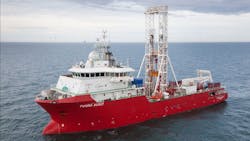Fugro joins TGS on site surveys for North Sea Dogger Bank wind farms
Fugro says that it will perform geotechnical surveys for the eastern array of the Dogger Bank South (DBS) offshore wind farms in the UK southern North Sea for RWE and Masdar.
The investigations will provide data on subsurface conditions at the wind turbine locations, inter-array cable routes, and platform foundations.
Next week, Fugro expects to mobilize various geotechnical vessels for the program, 122 km offshore England’s north-east coast. It will include cone penetration tests, vibrocores, and sampling boreholes.
To speed up collection of data, Fugro will deploy its SEACALF MkV Deep Drive system, and its VirGeo cloud-based Geo-data platform to centralise project information and deliver data to all stakeholders concerned.
The company’s previous work for DBS comprised preliminary geophysical and geotechnical investigations, a shallow geotechnical survey on the export cable route, and a geotechnical investigation of DBS west.
TGS is also conducting seabed geophysical surveys for the same eastern array, again for RWE and Masdar. TGS started its campaign last month, acquiring ultra-high resolution 3D seismic data for evaluating the subsea terrain at the turbine locations.
DBS’s two wind farms will have a combined capacity of 3GW. RWE is leading both projects, overseeing development, construction, and operations.
The two developments are advancing through the UK’s Nationally Significant Infrastructure Project (NSIP) planning process, with a consent decision expected by year end.
Assuming approval and FID, construction could start in 2026/27, with first power generation by 2030, and full completion by 2031/32.
